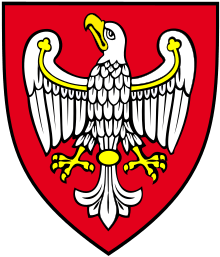Greater Poland Regional Assembly
The Greater Poland Regional Assembly (Polish: Sejmik Województwa Wielkopolskiego) is the regional legislature of the Voivodeship of Greater Poland. It is a unicameral parliamentary body consisting of thirty-nine councillors elected to a five-year term. The current chairperson of the assembly is Wiesław Szczepański.[1]
Greater Poland Regional Assembly Sejmik Województwa Wielkopolskiego | |
|---|---|
 | |
| Type | |
| Type | |
| Leadership | |
Chairperson | |
Vice-Chairpersons | Marek Gola, Jarosław Maciejewski, Małgorzata Waszak |
Marshal | |
| Structure | |
| Seats | 39 councillors |
 | |
Political groups | Executive board
Opposition parties
|
| Elections | |
Last election | 21 October 2018 |
| Meeting place | |
| Marshal's Office, Poznań | |
| Website | |
| Greater Poland Regional Assembly | |
The assembly elects the executive board that acts as the collective executive for the regional government, headed by the province's marshal. The current Executive Board of Greater Poland is a coalition government between Civic Coalition, Polish People's Party and Democratic Left Alliance with Marek Woźniak of Civic Coalition presiding as marshal.[2]
The assembly meets in the Marshal's Office in Poznań.
Districts
Members of the Assembly are elected from six districts, serve five-year terms. Districts does not have the constituencies formal names. Instead, each constituency has a number, territorial description.
| Number | Seats | City counties | Land counties |
|---|---|---|---|
| 1 | 6 | Poznań | None |
| 2 | 7 | None | Chodzież, Czarnków-Trzcianka, Międzychód, Oborniki, Piła, Szamotuły, Wągrowiec, Złotów |
| 3 | 7 | None | Poznań, Śrem, Środa Wielkopolska, Gniezno, Września |
| 4 | 5 | Konin | Konin, Koło, Słupca, Turek |
| 5 | 7 | Kalisz | Kępno, Kalisz, Ostrów Wielkopolski, Ostrzeszów, Jarocin, Pleszew |
| 6 | 7 | Leszno | Leszno, Gostyń, Grodzisk Wielkopolski, Kościan, Krotoszyn, Nowy Tomyśl, Rawicz, Wolsztyn |
Composition
1998[3]
| Party | Mandates | |
|---|---|---|
| Sojusz Lewicy Demokratycznej | 29 | |
| Akcja Wyborcza Solidarność | 21 | |
| Unia Wolności | 5 | |
| Przymierze Społeczne | 5 | |
| Total | 60 |
2002[4]
| Party | Mandates | |
|---|---|---|
| Sojusz Lewicy Demokratycznej – Unia Pracy | 13 | |
| Platforma Obywatelska – Prawo i Sprawiedliwość | 8 | |
| Samoobrona Rzeczpospolitej Polskiej | 7 | |
| Liga Polskich Rodzin | 6 | |
| Polskie Stronnictwo Ludowe | 5 | |
| Total | 39 |
2006[5]
| Party | Mandates | |
|---|---|---|
| Platforma Obywatelska | 15 | |
| Prawo i Sprawiedliwość | 12 | |
| Lewica i Demokraci | 7 | |
| Polskie Stronnictwo Ludowe | 5 | |
| Total | 39 |
2010[6]
| Party | Mandates | |
|---|---|---|
| Platforma Obywatelska | 17 | |
| Sojusz Lewicy Demokratycznej | 9 | |
| Polskie Stronnictwo Ludowe | 7 | |
| Prawo i Sprawiedliwość | 6 | |
| Total | 39 |
2014[7]
| Party | Mandates | |
|---|---|---|
| Platforma Obywatelska | 13 | |
| Polskie Stronnictwo Ludowe | 12 | |
| Prawo i Sprawiedliwość | 8 | |
| SLD Lewica Razem | 4 | |
| Teraz Wielkopolska | 2 | |
| Total | 39 |
2018[8]
| Party | Mandates | |
|---|---|---|
| Koalicja Obywatelska | 15 | |
| Prawo i Sprawiedliwość | 13 | |
| Polskie Stronnictwo Ludowe | 7 | |
| SLD Lewica Razem | 3 | |
| Independent | 1 | |
| Total | 39 |
Charts
 1998
1998 2006
2006 2010
2010 2014
2014 2018
2018
References
- "Prezydium Sejmiku". Urząd Marszałkowski Województwa Wielkopolskiego. Regional Assembly of Greater Poland. Retrieved 18 January 2016.
- "Skład Zarządu". Urząd Marszałkowski Województwa Wielkopolskiego. Marshal's Office of Greater Poland. Retrieved 18 January 2016.
- Tomasz Zarycki: Wybory samorządowe w 1998 r., [w:] Decentralizacja terytorialnej organizacji kraju: założenia, przygotowanie, ustawodawstwo (red. Grzegorz Gorzelak), Warszawa 1999, s. 54.
- Serwis PKW – Wybory 2002
- Serwis PKW – Wybory 2006
- Serwis PKW – Wybory 2010
- Serwis PKW – Wybory 2014
- Serwis PKW – Wybory 2018